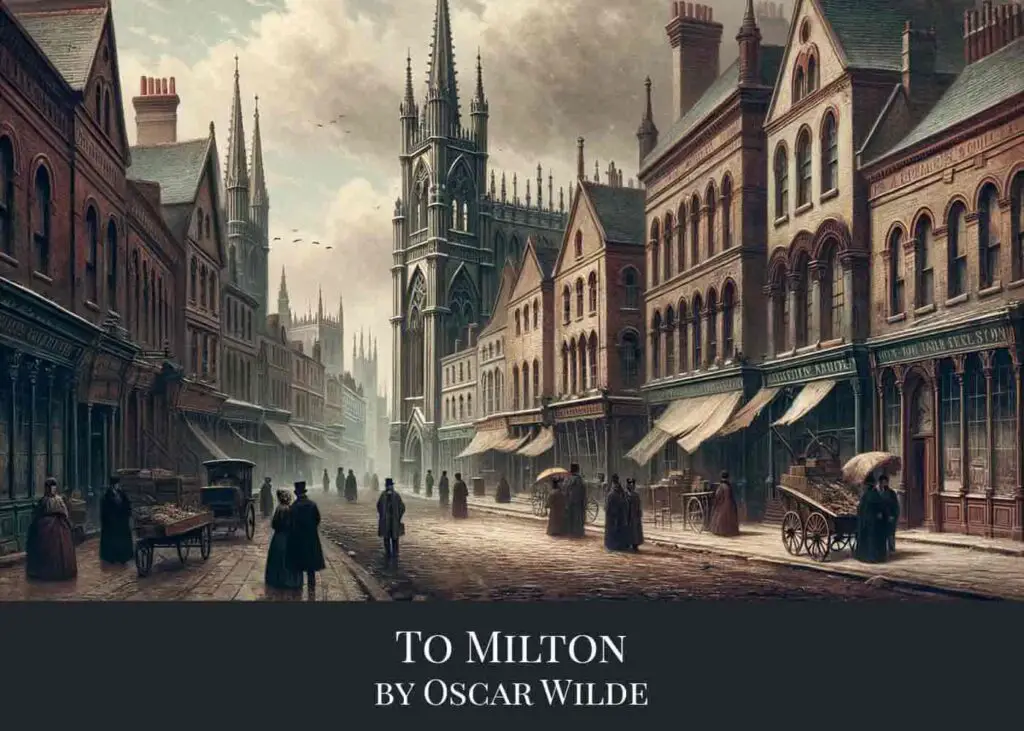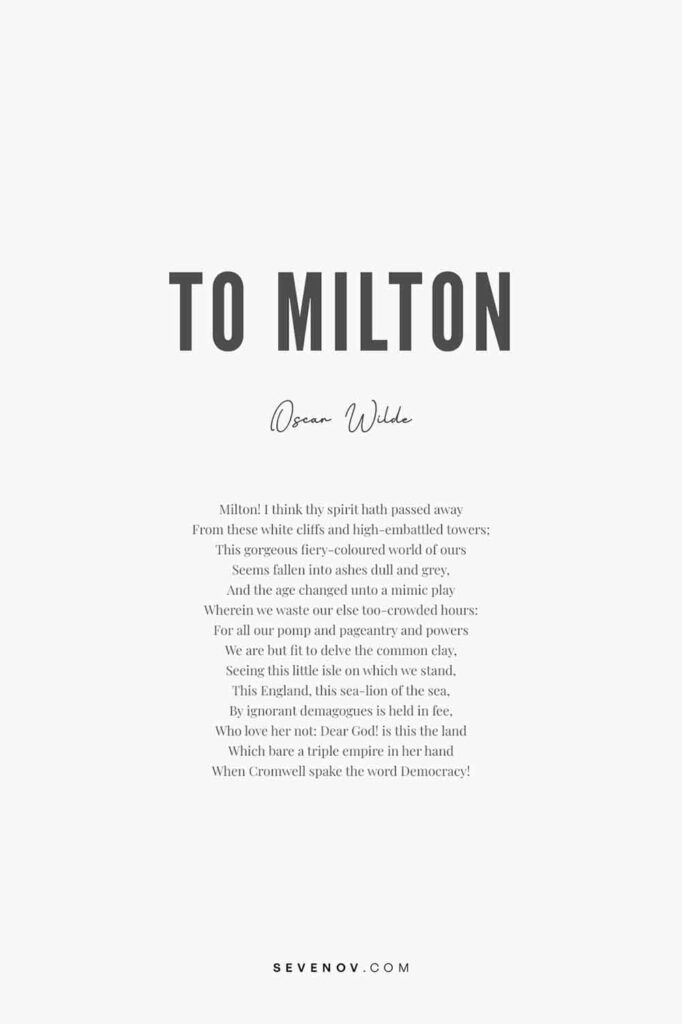
To Milton by Oscar Wilde
“To Milton” by Irish author, poet, and playwright Oscar Wilde is a poem that reflects on the perceived decline of England from its former glory, invoking the spirit of the renowned poet John Milton. Wilde contrasts the vibrant and dynamic world of Milton’s era with what he sees as the lifeless and colorless state of his contemporary England. This evocative poem is part of Oscar Wilde’s poetry collection Poems. Readers interested in exploring more of Wilde’s poetic works can find Poems ebook available at PageVio.
1. The Poem
Milton! I think thy spirit hath passed away
From these white cliffs and high-embattled towers;
This gorgeous fiery-coloured world of ours
Seems fallen into ashes dull and grey,
And the age changed unto a mimic play
Wherein we waste our else too-crowded hours:
For all our pomp and pageantry and powers
We are but fit to delve the common clay,
Seeing this little isle on which we stand,
This England, this sea-lion of the sea,
By ignorant demagogues is held in fee,
Who love her not: Dear God! is this the land
Which bare a triple empire in her hand
When Cromwell spake the word Democracy!

Size: 8″ x 12″ (2:3 ratio)
Format: PDF
Copyright information: For personal use only
Note: Actual poster background color is white. For the sample poster, the background is made gray for illustration purpose.
2. To Milton Analysis
“To Milton” reflects on the perceived decline of England from its former glory, contrasting it with the era of John Milton, a renowned poet, and Oliver Cromwell, a key figure in British history. It expresses a sense of loss and disillusionment with the current state of the country. Here’s a detailed breakdown:
Milton’s Departed Spirit
“Milton! I think thy spirit hath passed away / From these white cliffs and high-embattled towers;” – The poem begins with a direct address to John Milton, suggesting that the grandeur and spirit of Milton’s time have faded from England.
Loss of Vitality and Color
“This gorgeous fiery-coloured world of ours / Seems fallen into ashes dull and grey,” – The speaker laments that the vibrant, dynamic world of the past has become lifeless and colorless, using the metaphor of a world once bright and fiery now reduced to grey ashes.
Changed Times and Wasted Efforts
“And the age changed unto a mimic play / Wherein we waste our else too-crowded hours:” – The speaker criticizes the present as a mere imitation of greater times, implying that contemporary efforts and activities are wasted or meaningless.
Decline of National Greatness
“For all our pomp and pageantry and powers / We are but fit to delve the common clay,” – Despite all its apparent grandeur and power, the speaker suggests that the nation has been reduced to a mundane, base level.
England as a Sea-Lion
“Seeing this little isle on which we stand, / This England, this sea-lion of the sea,” – England is metaphorically described as a “sea-lion,” indicating its strength and dominance, particularly in naval power.
Mismanagement and Lack of Love for the Land
“By ignorant demagogues is held in fee, / Who love her not:” – The poet expresses discontent with the current leaders, accusing them of being unwise and not truly caring for the country.
Reference to a Glorious Past
“Dear God! is this the land / Which bare a triple empire in her hand / When Cromwell spake the word Democracy!” – The poem ends with a nostalgic reference to the time of Oliver Cromwell, under whose leadership England was a formidable power (“triple empire”). The mention of “Democracy” to Cromwell is likely anachronistic or symbolic, as Cromwell’s rule was more dictatorial than democratic, but it reflects the poet’s idealization of that era as one of strength and principle.
In essence, the poem mourns the loss of the grandeur and integrity that the poet attributes to the times of Milton and Cromwell. It portrays a sense of disillusionment with contemporary politics and society, contrasting it with an idealized past where England was perceived as more powerful and principled. Wilde uses this contrast to critique the present and to express a longing for a return to the values and greatness of the past.
3. Conclusion
If “To Milton” has piqued your interest, you might find exploring other poems by Oscar Wilde equally enriching.




